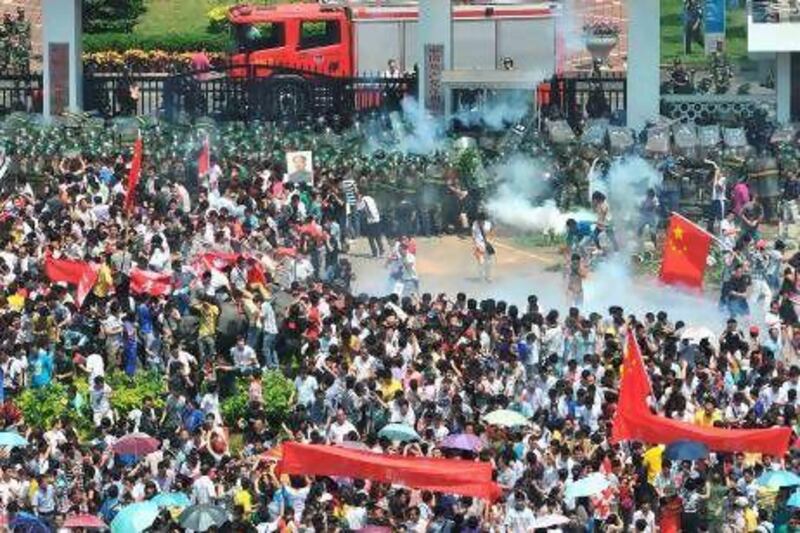BEIJING // Security personnel tightened their guard of the Japanese Embassy yesterday as crowds of Chinese continued to protest in the capital and across the country in sometimes violent demonstrations over islands claimed by both nations.
Japan's leader said the dispute was affecting the safety of Japanese citizens in China.
Rows of paramilitary police lined the perimeter of the embassy in Beijing as police let protesters in groups of up to 100 walk past the building. Many protesters threw items such as water bottles, bananas, tomatoes and eggs at the embassy and chanted that the disputed East China Sea islands, which are controlled by Japan, belong to China.
Dozens carried portraits of Chinese revolutionary leader Mao Zedong, who is often used as a rallying symbol. One man draped the Japanese flag over his dog.
Riot police stood on nearby streets, and around 20 of their vehicles were parked behind the embassy.
Security forces wearing helmets and carrying shields fired tear gas into crowds of people in Shenzhen city in southern Guangdong province. Some protesters picked up smoking tear gas canisters and threw them back in the direction of the security forces. Protesters also overturned a police vehicle and smashed one of its window. No one was reported injured.
Over 10,000 people marched in the provincial capital, Guangzhou, the state-run Xinhua News Agency said. Its Guangzhou office reported a small number of protesters broke into a hotel next to the Japanese consulate and smashed windows at a Japanese restaurant, and that police detained several people for damaging property.
Officers in Guangzhou asked the public to use their camera phones to record people smashing property and offer the evidence to police, the news agency said.
In Shanghai, hundreds of protesters across from the main gate of the Japanese consulate chanted and waved banners. About 50 paramilitary police officers stood outside. Police cordoned off the street and were allowing people to protest in groups of 50 for about five to 10 minutes before escorting them away.
Nearly 4,000 people demonstrated in the capital of China's tropical Hainan island, and largely peaceful protests occurred in seven other cities in the north, south and east "with few instances of looting and car smashing".
Some restaurants and shops selling Japanese goods closed and hung up Chinese flags as protesters approached, it said.
Anti-Japanese sentiment, never far from the surface in China, has been building for weeks, touched off by moves by Tokyo and fanned by a feverish campaign in Chinese state media. Passions grew more heated this past week after Japan's government purchased the contested East China Sea islands - called Diaoyu in China and Senkaku in Japan- from their private Japanese owners.
"We will not stand passively by and allow our territory and sovereignty to be invaded," a female voice said over loudspeakers broadcasting government messages in streets near the embassy. They urged people to obey the law and not to "disturb the social order".
Many of the protesters were in their 20s and 30s, but older people and families also took part.
In a sign that the Chinese government is concerned about social disorder spreading, users of China's popular Twitter-like Sina Weibo site could not search for the term "anti-Japan protests" on Sunday, and censors were quickly deleting videos of protests.
Some online users said they didn't dare drive around in their Japanese cars over the weekend.






